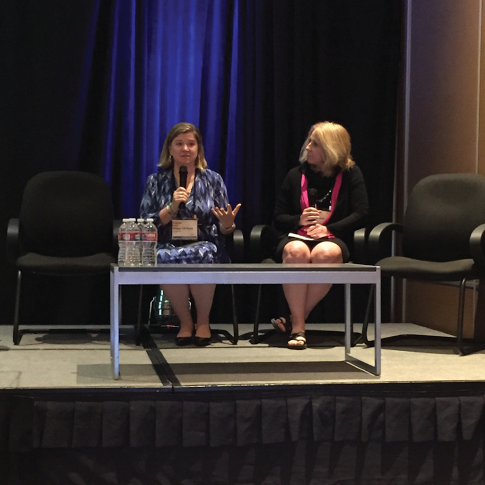(You can catch up on my takeaways from day one here!)

Jeannie Walters and Kathryn Churches
Today I was asked to share insights around emotional feedback, along with Kathryn Churches from American Family Insurance. It was a great discussion, and I think the emphasis on emotions underlines one of the biggest themes from this CX fest.
It’s really that simple, and yet that complex.
Author Jeanne Bliss, who is publishing Chief Customer Officer 2.0 very soon, discussed how companies have to earn the right to grow. They earn this right by creating desire, not loyalty. It’s a great distinction. Desire is an emotion. Loyalty isn’t.
RT @third_brain: @JeanneBliss is rocking #NGCE. Have a campaign to get rid of stupid rules. Amen!
— Jeannie Walters (@jeanniecw) March 24, 2015
David Mingle, Executive Director, North American Customer Experience for General Motors, shared how CEO Mary Barra visits GM’s call centers and social command center to get a better sense of how customers are feeling.
‘Your CEO needs to put the customer first; strong leadership drives strong culture’ David Mingle @GM #NGCE — Nick Ris (@nickris) March 24, 2015
Rachel McCarthy, Vice President of Inflight Experience for JetBlue Airline, mentioned how a full can of soda can be seen as inspiring. It’s about the little things that make people feel valued. And how surveys tell them about how personal connections make the experience, especially when they hear about specific crew members more often than not.
Excellent talk from #jetbluemint Rachel McCarthy at #NGCE @GreyHealth pic.twitter.com/OdmjBNvXo4
— David Brightmore (@digiceutical) March 24, 2015
Throughout these discussions, emotional connections are seen as both the holy grail of experience and the burdensome metric to explain. Emotions do matter.
I shared how I believe we have to get over ourselves. Our customers don’t obsess about our brands. They don’t care about our moments like we do. Until they do. Or don’t. That’s what shows up on surveys.
My hope is that when analyzing customer metrics, we will start recognizing that emotions don’t always need data to prove themselves out. We know what’s right and what’s not. And yet too often we sing the refrain of “let’s wait for the data.” There’s no need to wait.
Being human shouldn’t be this hard, but truthfully it is in many organizations. My hope is that “the right thing to do” becomes a metric enough to cause action.
 Jeannie is an award-winning customer experience expert, international keynote speaker, and sought-after business coach who is trailblazing the movement from “Reactive Customer Service” to “Proactive Customer and Employee Experience.” More than 500,000 people have learned from her CX courses on LinkedIn Learning, and her insights have been featured in Forbes, The Chicago Tribune, The Wall Street Journal and NPR.
Get Jeannie’s insights in your inbox each week by subscribing to The Weekly Win and follow her on LinkedIn, Instagram and YouTube.
Jeannie is an award-winning customer experience expert, international keynote speaker, and sought-after business coach who is trailblazing the movement from “Reactive Customer Service” to “Proactive Customer and Employee Experience.” More than 500,000 people have learned from her CX courses on LinkedIn Learning, and her insights have been featured in Forbes, The Chicago Tribune, The Wall Street Journal and NPR.
Get Jeannie’s insights in your inbox each week by subscribing to The Weekly Win and follow her on LinkedIn, Instagram and YouTube.